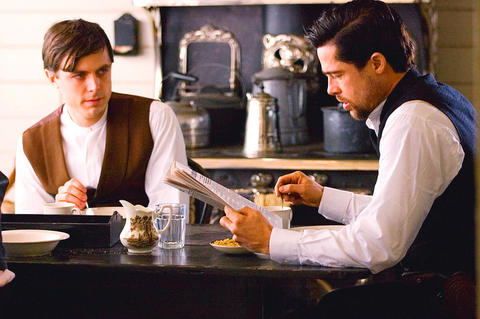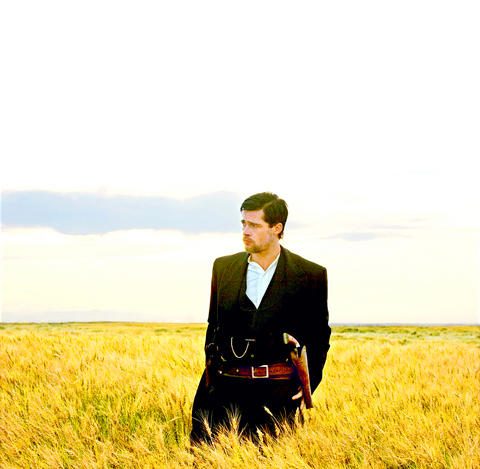Before a bullet shattered his skull in 1882, Jesse James cut a bloody swath through parts of the Midwest and the South, leaving a trail of corpses and favorable press notices in his wake. Bad man, poor man, bushwhacker, thief, James was as American as apple pie and the Confederate flag he wrapped himself in like an excuse. That bard of the great unwashed, Woody Guthrie, compared him to Robin Hood, and decades later Bruce Springsteen kept the fires burning, singing about a homespun legend as seductive as it is false.
The lachrymose new film The Assassination of Jesse James by the Coward Robert Ford adds another gauzy chapter to the overtaxed James myth, if not much rhyme or reason, heart or soul. Topped by Brad Pitt wearing boot-black hair and a faraway stare, this is a portrait of the murderer as a middle-aged man as seen through the curious mirror of celebrity. At a well-seasoned 34, James lives in an ordinary house in an ordinary town, where he sits in his backyard smoking cigars and handling snakes, a devil playing at preacher. His days with Confederacy guerrillas are long gone, as are most of his crimes. Among his closest companions now is his greatest fan, Bob Ford, a gunslinger slyly played by Casey Affleck.
As its title announces, The Assassination of Jesse James by the Coward Robert Ford is about a murder, the last violent chapter in a cruelly violent life. As such, it's also about a celebrity stalker, a kind of Mark David Chapman in spurs who nurses an annihilating love for the object of his obsession. It's an obsession fueled and fanned by the media, including the sympathetic newsmen who saw James as a heroic anti-Reconstructionist, and the fiction writers who memorialized and even exalted the brutal exploits of his gang. Like a schoolgirl with a crush, Bob Ford keeps his treasured Jesse James dime novels in a box under his bed. When he caresses the cover of one book, it's as if he were tenderly stroking a lover's cheek.

PHOTO: COURTESY OF WARNER BROS
If there was more to Bob's love, you won't find it here, despite a coy bathtub scene that finds James luxuriating in milky water while the younger man hovers uncertainly nearby. "You want to be like me or do you want to be me?" asks James, casting his glance back at the man others would later brand Judas. In this nearly all-male world of camaraderie and gunsmoke, where little women bustle discreetly in the background (including Mary-Louise Parker as James' wife, Zee), the ways of the flesh, of heaving, stinking, struggling humanity, have little place. For all their exploded bone and ravaged pulp, their trickles and rivulets of blood, the men in this film aren't as much bodies as beautiful, empty signifiers.
In his last - and first - feature film, Chopper (2000), the New Zealand-born director Andrew Dominik seemed on the same wavelength as his raucous, at times queasy, entertaining subject, the ultrabrutal criminal reprobate of the title, played by Eric Bana. Neither overtly sympathetic nor disapproving, the filmmaker presented his villain as a larger-than-life but unequivocally human grotesque. Using color like an Expressionist, he bleached the screen a sizzling white that turned blood red nearly black and splashed on hues of bilious green and urine yellow as if to suggest that Chopper's fluids had leaked from his body to contaminate his surroundings. The colors sicken and beguile, as does the human riddle at their center.
There's a different riddle in The Assassination of Jesse James, staring into a florid sunset, slashes of red cutting across the sky. Dressed in near-all black, the question mark known as Jesse James stands away from the camera, knee-deep in a golden, grassy field stirred by the wind or perhaps just an off-screen mechanical fan.

PHOTO: COURTESY OF WARNER BROS
It's a striking, pleasing image, whatever the case, pretty as a picture postcard, a vision of man and nature that brings to mind Thoreau at Walden Pond or more precisely Terrence Malick's Days of Heaven. James is also facing West, of course, toward the last frontier, home to cowboys and Indians and prospectors of all types, including, soon enough, those who will wield movie cameras, not six-shooters.
If he had lived, James might have saddled up for the movies, and, indeed, his own son played him in the 1921 film Jesse James Under the Black Flag. When The Assassination opens in September 1881, shortly before his final train robbery and seven months before his death, James was already a star of sorts, a living if fast-aging legend, a favorite newspaper subject, a government target and the featured attraction in hundreds of dime novels with titles like The James Boys and the Vigilantes. Pitt is himself a supernova luminary, of course, and part of the attraction of this film is how his celebrity feeds into that of his character, adding shadings to what is, finally, an overconceptualized if under-intellectualized endeavor.
It's a curious performance, at once central and indistinct, but then, so too is the character. Based on the novel of the same title by Ron Hansen, the film introduces James at the beginning of his end. Hunkered down in some woods, surrounded by darkly dressed men and leafless birch trees, and framed by Roger Deakins's impeccable, stark, high-contrast cinematography, he looks a vision. This isn't just Jesse James - it's also Jim Morrison at the Whisky in 1966 with a dash of Laurence Olivier, a touch of Warren Beatty and more than a hint of Ralph Lauren. It's the beautiful bad man, knowing and doomed, awaiting his fate like some Greco-Hollywood hero, rather than the psychotic racist of historical record.
The movies have their truths, which rarely align with those of history. Taken on its own narrow, heavily aestheticized and poetic-realist terms, then, The Assassination of Jesse James by the Coward Robert Ford works. The cinematography may speak to Dominik's yearning for meaning and importance more than it does of his outlaw, but the visuals often dazzle and enthrall. (The images that approximate the blurred distortions characteristic of pinhole photography are especially striking.) They also distract and, after a while, help weigh down the film, which sinks under the heaviness of images so painstakingly art directed, so fetishistically lighted and adorned, that there isn't a drop of life left in them. Instead of daguerreotype,. Dominik works in stone.
The question of whether the world or cinema needs another monument to an American gangster, a thug who lived by the gun and repeatedly killed in cold blood, remains unanswered by the film and its makers. And perhaps that isn't a question worth asking. This is, after all, meant to be an evening's entertainment, and its burdens should remain modest even if its goals are not. Its revelations, aside from Affleck's performance, which manages to make the character seem dumb and the actor wily and smart, are nonexistent. The true story of Jesse James, despite all the dime novels and B movies, remains untold, perhaps because in its savagery it really is as American as apple pie and, as such, unspeakably hard to tell.

June 23 to June 29 After capturing the walled city of Hsinchu on June 22, 1895, the Japanese hoped to quickly push south and seize control of Taiwan’s entire west coast — but their advance was stalled for more than a month. Not only did local Hakka fighters continue to cause them headaches, resistance forces even attempted to retake the city three times. “We had planned to occupy Anping (Tainan) and Takao (Kaohsiung) as soon as possible, but ever since we took Hsinchu, nearby bandits proclaiming to be ‘righteous people’ (義民) have been destroying train tracks and electrical cables, and gathering in villages

This year will go down in the history books. Taiwan faces enormous turmoil and uncertainty in the coming months. Which political parties are in a good position to handle big changes? All of the main parties are beset with challenges. Taking stock, this column examined the Taiwan People’s Party (TPP) (“Huang Kuo-chang’s choking the life out of the TPP,” May 28, page 12), the Democratic Progressive Party (DPP) (“Challenges amid choppy waters for the DPP,” June 14, page 12) and the Chinese Nationalist Party (KMT) (“KMT struggles to seize opportunities as ‘interesting times’ loom,” June 20, page 11). Times like these can

Dr. Y. Tony Yang, Associate Dean of Health Policy and Population Science at George Washington University, argued last week in a piece for the Taipei Times about former president Ma Ying-jeou (馬英九) leading a student delegation to the People’s Republic of China (PRC) that, “The real question is not whether Ma’s visit helps or hurts Taiwan — it is why Taiwan lacks a sophisticated, multi-track approach to one of the most complex geopolitical relationships in the world” (“Ma’s Visit, DPP’s Blind Spot,” June 18, page 8). Yang contends that the Democratic Progressive Party (DPP) has a blind spot: “By treating any

Swooping low over the banks of a Nile River tributary, an aid flight run by retired American military officers released a stream of food-stuffed sacks over a town emptied by fighting in South Sudan, a country wracked by conflict. Last week’s air drop was the latest in a controversial development — private contracting firms led by former US intelligence officers and military veterans delivering aid to some of the world’s deadliest conflict zones, in operations organized with governments that are combatants in the conflicts. The moves are roiling the global aid community, which warns of a more militarized, politicized and profit-seeking trend